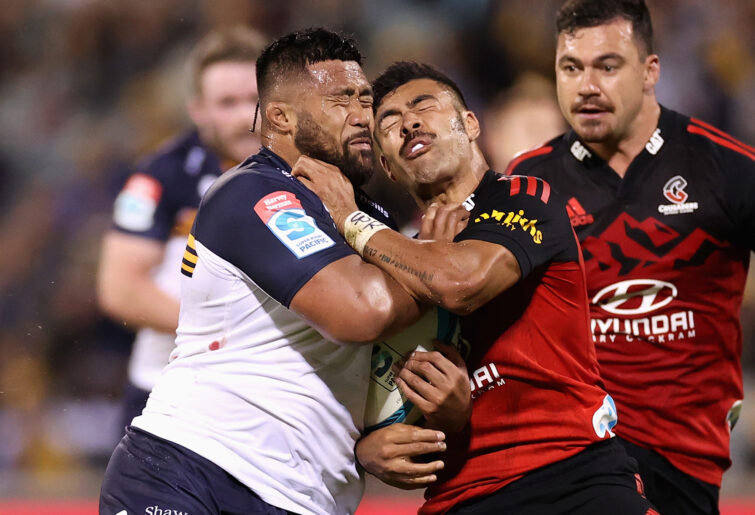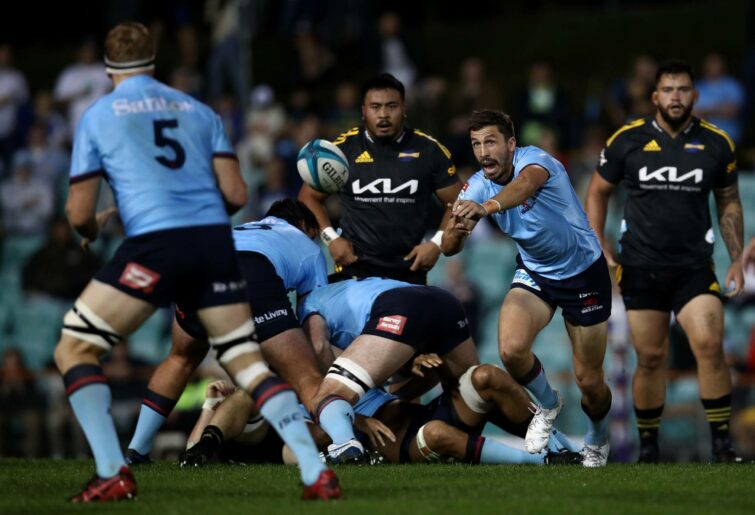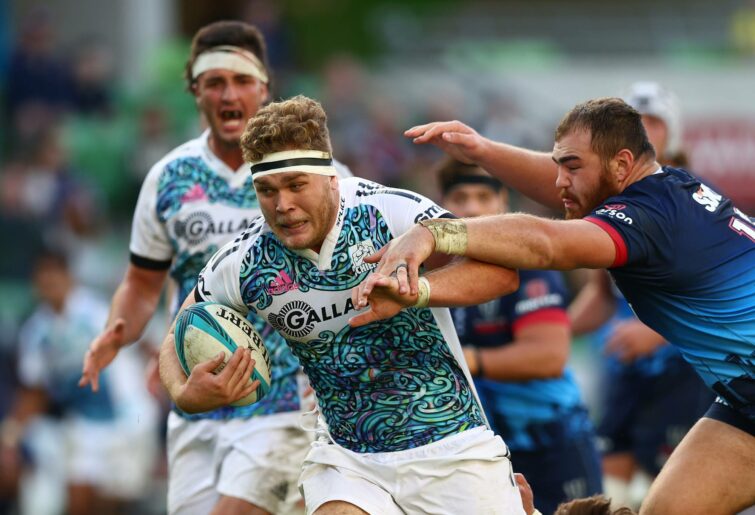The key to competing with, never mind beating, New Zealand sides was always going to be how well Australian teams could control the pace of games and not get sucked into playing the game the way the Kiwis would want it played.
The three close Australian losses all had the fingerprints of teams not quite getting that right.
After a great start, the Brumbies tried to play up tempo and in the face of the Crusaders in the first half in Canberra, rather than sticking to what had worked so well for them the previous three weeks, and what had produced three really good wins.
They kicked poorly, dropped off collisions and missed cleanouts, and went away from the set-piece game that is their hallmark. And it was no surprise they went into the sheds down 23-5.
When they went back to doing what they have been doing well, they matched the Crusaders very well in the second half.

(Photo by Cameron Spencer/Getty Images)
The damage was probably done, but the shift of mindset was clear in that the Brumbies stopped playing like they had to prove something against the Crusaders, and instead just resumed playing the game that until the 40 minutes before halftime actually serves them very well against New Zealand sides.
That needs to be the approach this week against the Blues. It’s just another side from over the Tasman, and their record against them has been pretty strong this season.
The Waratahs were outstanding for the first 40 minutes in front of more than 11,000 fans at Leichhardt Oval on Saturday night, and then just weren’t for the second 40.
They defended superbly and pressured the Hurricanes into mistakes, which they then pounced on and created opportunities themselves. They played to where the space was, and when it was there, they finished well to lead 15-0 at the break.
And they should have led by more, if not for some none-too-subtle footwork at the back of their scrum from their captain, at the very least.
After halftime though, all that somehow went out the window, and Darren Coleman’s “15 points won’t be enough” point to the Stan and Nine halftime panel looked positively prescient when the gap had shrunk to five within 16 minutes.
Certainly, the Hurricanes dragging their starting front row had an impact, but it was like the Waratahs didn’t know what to do without the set-piece domination they enjoyed in the first half – ironic, considering how they played for most of 2021.
When they needed to keep the scoreboard ticking, they made poor decisions and missed shots at goal, and worse, the Hurricanes would then score up the other end. When they needed patience and control, they only had haste and panic.

(Photo by Jason McCawley/Getty Images)
There are numerous moments the Tahs would want back in that second half, players and coaches alike. Replacing Jake Gordon with two minutes to play would rank highly on that list.
But they too have played some excellent rugby over the last few weeks, and that’s all they need to remind themselves before they make the long trip to Dunedin.
The Rebels’ intensity drop-off in those closing stages when they led 27-26 would be of most concern this week leading into the Hurricanes in Wellington, and not to put too fine a point on it, it will quite likely cost them any chance of sneaking into eighth spot.
After starting pretty well and being denied a try that certainly warranted a closer look, the Rebels similarly lost their head and conceded two tries in six minutes.
But after getting themselves back into the contest and scoring twice either side of halftime to take the lead, they did the same thing again to find themselves down again by nine.
Rebels teams of the not-too-distant past – like, even just the last few weeks – would have lost their nerve completely at this point, but they didn’t and they should focus on that this week.
Reece Hodge’s runaway try vaulted them back into the contest and they smartly kicked two penalties to lead by four.
Their last three minutes wouldn’t have made for comfortable watching in the review, and the Chiefs were allowed to make far too much ground way too easily in the lead-up to the winning try.
The Rebels’ lack of intensity belied all the hard work they’d done to put themselves in position to win, and that is the great shame of it.

(Photo by Graham Denholm/Getty Images)
If there’s a silver lining, it’s that at least it was only Round 13, and not the first week of knockout finals.
The Brumbies, Waratahs, and Rebels all copped harsh lessons in game management and not getting away from the core components of your game – and especially not when it was working well.
Players will just have to adjust, they said
Rebels centre Ray Nu’u’s repeat high tackle, red card, and suspension in his first game back from a suspension from a red card for a high tackle in Round 11 was a horrible look, and I remain firm in my view that his second suspension should have been way harsher than it was.
But that bad look might have a new challenger in the form of Highlanders lock Josh Dickson.
Dickson was suspended for three weeks back in Round 9, and like Nu’u was able to return to action a week early after successfully completing World Rugby’s prescribed Head Contact Process Coaching Intervention education course for foul play that involves the Head Contact Process.
On his return in Round 12, he got a yellow card for high contact. Next game, he got another yellow card for high contact.
So, Dickson successfully completed an education course designed specifically to “address the technical tackle/contact technique-error that caused or contributed to the foul play” but has now twice re-offended since.
Last week, his 13th-minute yellow card for high contact on Reds prop Feao Fotuaika was obviously deemed not to have met the red-card threshold, and nothing more was said about it.
At the time of writing, his 33rd-minute yellow for high contact on Force back rower Tim Anstee this weekend just gone may or may not end the same way.
But regardless of what happens, this point is undeniable: a player who was sent off in a game a month ago for high contact and suspended for three weeks successfully reduced that ban by a week by completing the education process that really should be delivered to players before they offend, rather than after, and then twice re-offended and earned yellow cards for high contact in successive games following the education course.
So, I’ll just leave this point with a question: are we sure players are getting the message about high contact?
Springboks prop Frans Malherbe joined The Roar rugby experts Brett McKay and Harry Jones to talk about his unusual rugby origin story, what surprised him about the United Rugby Championship coming out of Super Rugby, and Rassie Erasmus’ call for a specialist scrum referee.































































































